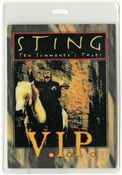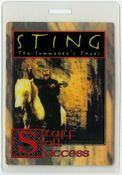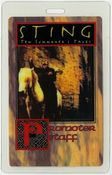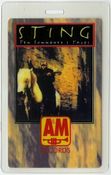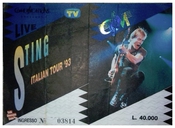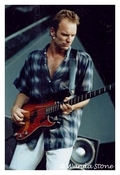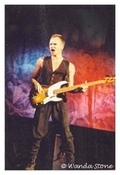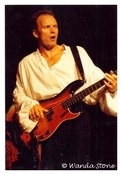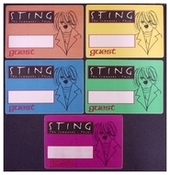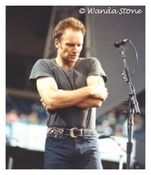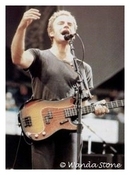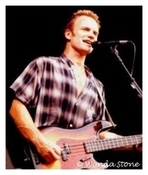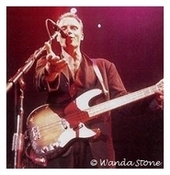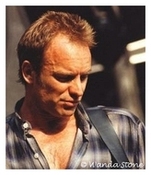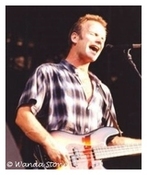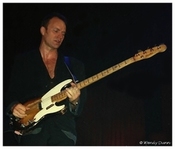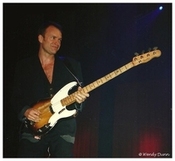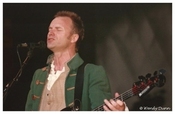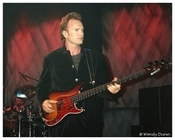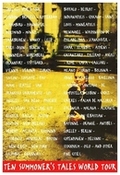
Sting sings seductive notes - The musician's beautiful concert at Rome's Palaeur. And a whole new energy...
With his suitcase full of odd and sinuous time signatures, with books by Chaucer and Jung in his pocket, and with a band of musicians ready for anything, the "infamous" Sting, alleged crowd-raiser and instigator of violent Dionysian possessions, according to some zealous police officers, arrived at Rome's Palaeur.
The audience, present in large numbers despite the enclosed space, unsuitable for the hot season, celebrated him for what he is: a musician capable of celebrating a vigorous and refined celebration of music, without excess, without delirium, but only with great enthusiasm. Sting himself, who has made the artistic elevation of pop music a personal affair, at times even overdoing it with affectation and convoluted frills, to the point of even hinting at a parvenu band that, when necessary, becomes more royal than the king. But that's history. Sting today has regained his strength and inspiration, finding the perfect balance between Apollo and Dionysus, offering refined tales but also pure enjoyment of musical energy, with blistering surges and robust rhythms.
He demonstrated this with his latest album, 'Ten Summoner's Tales,' and even more so, of course, with this concert, all about the exaltation of music played—intensely, voluptuously, energetically. Only three partners, but those worthy of an orchestra: Vinnie Colaiuta on drums, David Sancious on keyboards, and the young Dominic Miller on guitar, plus Sting on bass, his original instrument, form the most classic of quartets. Dim lighting, scant stage effects, aside from a few timid smokestacks and a shimmering array of coloured drapes at the back of the stage—really the bare minimum, as if to underscore the desire to offer a concert of music, in the most direct and essential sense of the word, free of visual interference and disturbances.
Throughout the first half of the concert, Sting performed almost the entire sequence of his latest album, starting with "If I Ever Lose My Faith In You" and ending with the epilogue of "Nothing About Me," through "Seven Days," "Love Is Stronger Than Justice," and the album's other "stories." But he followed this lead with frequent digressions, including an absolutely surprising one: the Beatles-esque "A Day in the Life," considered one of their greatest compositions ever. Then came several great Police-era classics, including the inevitable "Roxanne," this time performed as a group and not alone as he usually did; the frenetic "Synchronicity," harking back to his infatuation with Jungian theories; "King of Pain," and the customary medley of "Bring on the Night" and "When the World Is Running Down." The version he offers with this group is particularly powerful. His partners are the ideal musicians for Sting's musical project.
They are authoritative, impactful, but also flexible enough to accommodate the fast and sudden musical digressions of these pieces, from soft jazz to reggae, from country to rock, and above all capable of launching into daring solo improvisations. At times the result, though highly effective, is a bit too academic, in the sense that it lacks what had been the Police's great strength: their signature style, the unmistakable expression of a signature that was entirely original, beyond the instrumental prowess of their members.
In
the absence of that signature, we must appreciate diametrically opposed qualities: a great love for the potential richness of musical communication, and also the demonstration of how pop music can be a mature, culturally advanced terrain, with limitless formal possibilities. And it must be said that Sting, from this perspective, is one of the most accomplished contemporary pop songwriters at combining simplicity and refinement. Proof of this is his stunning "Every Breath You Take," triumphantly performed at the concert finale amidst widespread enthusiasm. It's a song that's simple to listen to, captivating, full of mischief and hidden meaning, but which exploits a far from simple chord sequence, rare in the ordinary compositional patterns of pop music. And it's ultimately the quality of Sting's best work, the fruit of a difficult balance, one that Sting himself has inevitably lost from time to time, but which today he seems determined to reassert with force.
Even his narcissistic poses, which had drawn considerable criticism, seem much toned down. Throughout the concert, more than a rock star, he seemed like a serious musical professional trying to pay homage to his craft. Only at the end, during the encore, did he appear shirtless, to the delight of his most ardent fans, but at this point, considering the unrestrained exhibitionism of a few years ago, this can be considered a truly venial sin.
(c) La Republica by Gino Castaldo (thanks to Valeria Vanella)

